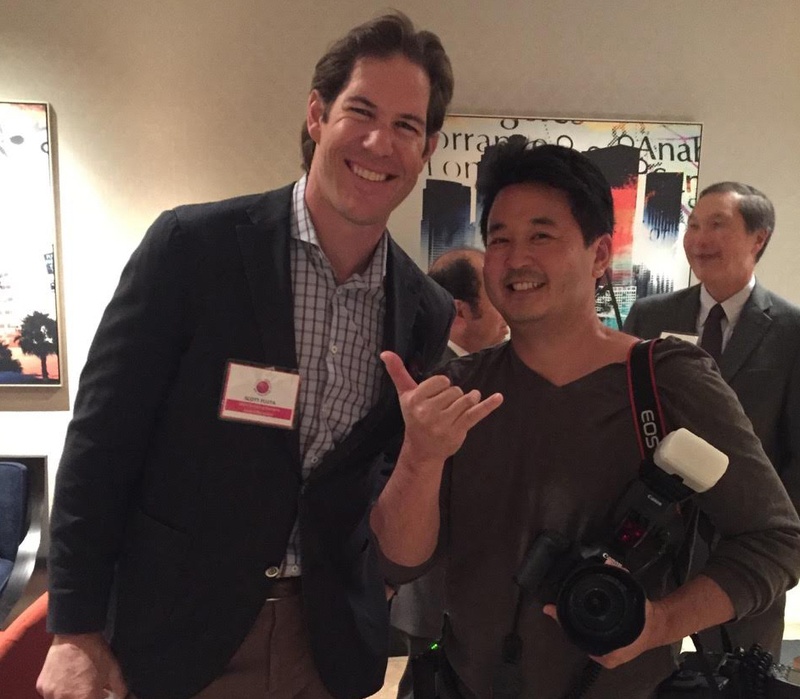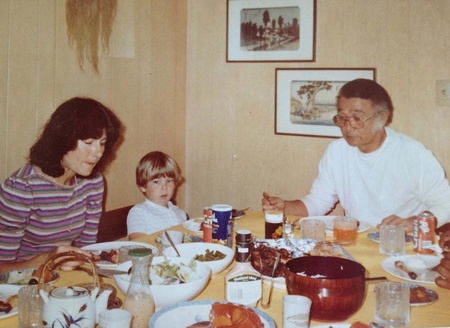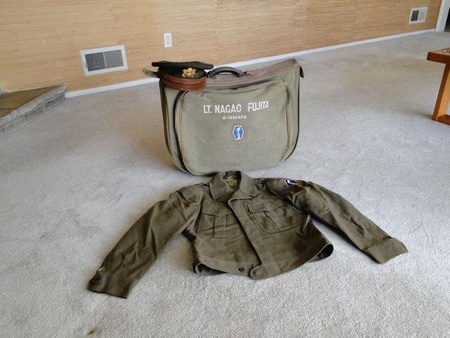Over the weekend I was working at the Japanese American Bar Association Annual Fundraising Gala. A fantastic organization that supports lawyers and speaks about issues with Japanese influences. Every year they have a great show with well deserved awardees. This year I was happy to meet Scott Fujita, Super Bowl Champion, producer from the award winning documentary Gleason, and creator of the “Ice Bucket Challenge.” There was a long line of ladies wanting to take a picture with him…..If I just had a quarter for each picture this year!
He told his story about growing up in Oxnard the adopted son of Rodney and Helen Fujita, and he spoke about how his friends came over and most of them were too afraid to try sushi. Everyone in the room was captivated with his story about how he feels in touch with Japanese American heritage, and how he considers himself half Japanese. With the Saints he stood up to a teammate in the locker room who called Japanese Americans “Japs”, and how without getting too upset he was able to educate him by telling him about the true stories about the Japanese ordeal. He speaks fondly about his grandfather Nagao Fujita who was a member of the 442.
Finally he inspired a room full of lawyers how important they were at this time of political turmoil, and how it was “their time to shine” At 6’5 Scott Fujita is a commanding presence, but his speech and charisma was even more powerful.
Here is a story by Scott Fujita.
* * * * *

I’d always been told that I had a small contingency of football fans back in Japan, and that the media would cover my career in a semi-regular way. But no one ever actually made the trip here to the U.S. to see me play in person. So I think they simply heard about a "FUJITA" name that perhaps someone spotted on the back of a jersey, and everyone naturally assumed they were following an actual Japanese guy who plays American football. Pretty funny. So imagine their surprise when they saw me in person at Super Bowl Media Day, when a Japanese media contingency trekked across the Pacific to pay this FUJITA guy a visit once and for all, ahead of Super Bowl XLIV in Miami, FL.
Here they are in this gigantic convention center style building, among thousands of other media from around the world, searching for “Fujita the Japanese-American football hero.” I swear that I could see the look of surprise, and perhaps disappointment, on their faces. They were befuddled. “Who’s this big ol’ 6'-5" 250 pound gangly white dude with floppy California surfer boy hair, who calls himself FUJITA?” But I guess they figured they had traveled all this way, so they might as well hear my story.
A conversation begins, and stories are shared.
What began as a light-hearted discussion about a white kid who used to introduce himself to new friends in a peculiar way (“Hi, I’m Scott, I’m 4, and I’m Japanese!”), evolved to a broader discussion about adoption, Pearl Harbor, Japanese internment and WWII, the 442nd, issues of equal rights and fairness, 9/11, xenophobia, mixed race marriage, Loving v. Virginia, etc. You know, all the stuff you'd expect to hear at Super Bowl Media Day!
Given the scope of the media presence in Miami that week, one of the unforeseen benefits of these “stories” getting shared in that setting, is that a lot of people were hearing about some of these things for the first time. Most notably, internment and the 442nd. They learned about Nagao and Lillie Fujita, my grandparents, and their experience in the Gila River internment camp, where my father Rod was born in 1943.
I imagine the media in attendance sensed a particular amount of pride in me when I discussed my grandfather’s enlistment with the 442nd Regimental Combat team, which became one of the most highly decorated battalions in U.S. military history. “You mean he volunteered to fight for the U.S., while his family was imprisoned in the desert?” was a common question I’d get asked.
I talked about the 442nd’s “Go For Broke” mantra, and what it means to me. A gambling term, I explained. Laying it all on the line. Going all in. Putting all your chips on the table.
And when you dig a little bit deeper, this idea of supporting a nation who has essentially characterized you and your family as “enemy aliens,” really does seem like a gamble of enormous stakes. You’re volunteering to perhaps make the ultimate sacrifice for a country who’s forced you from your homes and robbed you of your freedoms. But perhaps another perspective is that you’re embracing the opportunity to prove your loyalty and patriotism to your country, in spite of this mistreatment. And you’re doing this without knowing what might be waiting on the other side, assuming you make it home alive. Will you be embraced, appreciated, and ultimately, accepted as the good Americans you are? Or will these toxic feelings of xenophobia persist?
It’s incumbent upon us—the families, survivors, and friends of those interned and of the 442nd—to continue to share their stories. Their legacy still carries significant resonance, perhaps now more than ever. We should point to their resilience and leadership as we tell their story to our children, neighbors, and elected officials.
My grandparents, and their peers, bet on us. They wagered that their contributions and sacrifice might change hearts and minds. Now our generation needs to ensure that their gamble paid off. Go For Broke.
*This article was originally published on The Go For Broke Sprit on March 6 and April 14, 2017. The Go For Broke Spirit: Portraits of Courage is a book of the portraits of Japanese American Nisei Veterans by the author. He has launched a Kickstarter fundraising campaign to help offset the costs and to continue photographing remaining veterans on the East Coast. Kickstarter named his project one of its “Projects We Love.” It runs until October 21, 2017.
© 2017 Shane Sato





